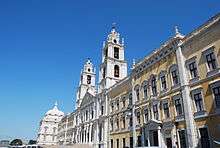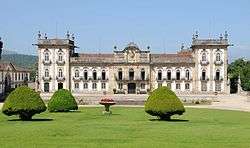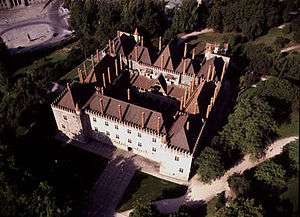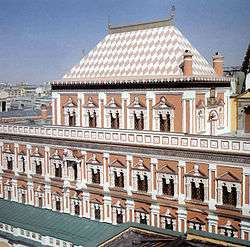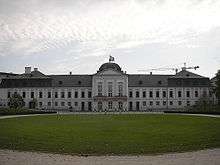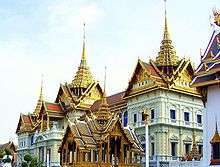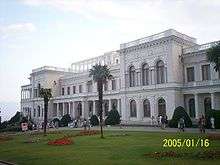List of palaces
Afghanistan
- Darul Aman Palace, Kabul - The country's most famous palace.
- Tajbeg Palace - Inaccurately known as the Queen's Palace in English
- Arg Presidential Palace[1] - Home of the President of Afghanistan
Albania
- Presidenca - Official residential palace of the President of the Republic.
Australia
- Government House, Canberra - Official residence of the Queen of Australia. Full-time residence of the Governor General of Australia.
- Government House, Sydney - Official residence of the Governor of New South Wales, the state's representative to the Queen of Australia.
- Government House, Adelaide - Official residence of the Governor of South Australia, the state's representative to the Queen of Australia.
- Government House, Brisbane - Official residence of the Governor of Queensland, the state's representative to the Queen of Australia.
- Government House, Melbourne - Official residence of the Governor of Victoria, the state's representative to the Queen of Australia.
- Government House, Hobart - Official residence of the Governor of Tasmania, the state's representative to the Queen of Australia.
- Government House, Perth - Official residence of the Governor of Western Australia, the state's representative to the Queen of Australia.
- Government House, Darwin - Official residence of the Administrator of the Northern Territory, the territories representative to the Queen of Australia.
- Admiralty House - Official Sydney residence of the Governor General of Australia.
- The Lodge - Official residence of the Prime Minister of Australia
- Kirribilli House - Official Sydney residence of the Prime Minister of Australia.
Austria
- Schloss Ambras, Innsbruck - Residence of Archduke Ferdinand II, from 1563 to 1595
- Alte Residenz, Salzburg - former palace of the Prince-Archbishops of Salzburg
- Belvedere Palace - former summer residence of Prince Eugene of Savoy, Vienna
- Hofburg Palace - Seat of Federal President, formerly the Imperial residence, Vienna
- Schönbrunn Palace - former imperial summer residence of the Habsburg Monarchs, Vienna
- For city palaces in Vienna (Palais), see Category:Palaces in Vienna
Azerbaijan
- Palace of Nakhchivan Khans — palace in Nakhchivan.
- Palace of Shaki Khans — palace in Shaki.
- Palace of the Shirvanshahs — palace in Baku.
Bangladesh
- Ahsan Manzil - former residence of the Nawab of Dhaka
- Bangabhaban - Official residence of the President of Bangladesh, former viceregal house in Dhaka
- Bhawal Rajbari, Gazipur, Bangladesh
- Ghughu-danga Zamindar Bari, Dinajpur, Bangladesh
- Moyez Manzil, Faridpur, Bangladesh
- Rani Bhabani's Palace
- Tajhat Palace, Rangpur
- Rose Garden Palace, Dhaka, Bangladesh
- Natore Rajbari, Natore, Bangladesh
- Ruins of Sonargaon Palace, Dhaka, Bangladesh
- Dhanbari Palace, Tangail, Bangladesh
- Baliati Palace, Manikganj, Bangladesh
- Dighapatia Palace, Natore, Bangladesh
- Shoshi Lodge, Mymensingh
Belarus
Belgium
- Egmont Palace in Brussels
- Palace of the Count of Flanders
- Royal Castle of Laeken, Brussels and Royal Greenhouses of Laeken
- Royal Palace of Antwerp, Antwerp
- Royal Palace of Belgium, Brussels
Benin
- Royal Palaces of Abomey - Seat of the Kings of Abomey
Bhutan
- Dechenchholing Palace - Royal residence of the King of Bhutan
Bolivia
Brazil
- Paço Imperial
- Palácio Antônio Lemos
- Palácio Anchieta
- Palácio Araribóia
- Palácio Araguaia
- Palácio Arquiepiscopal
- Palácio Brocoió
- Palácio Campo das Princesas
- Palácio da Aclamação
- Palácio da Alvorada - Presidential residence in Brasilia
- Palácio da Conceição
- Palácio da Concórdia
- Palácio da Fonte Grande
- Palácio da Justiça
- Palácio da Liberdade
- Palácio da Vitória
- Palácio das Artes
- Palácio das Indústrias
- Palácio das Princesas
- Palácio de Brocoió
- Palácio de Cristal
- Palácio de Ondina
- Palácio de São Cristóvão
- Palácio do Anhangabaú
- Palácio do Buriti
- Catete Palace - former presidential residence
- Palácio do Conde dos Arcos
- Palácio do Itamaraty - Rio de Janeiro - former Ministry of External Relations
- Palácio do Itamaraty - Ministry of External Relations
- Palácio do Congresso Nacional - National Congress and House of representatives
- Palácio do Lavradio
- Palácio do Jaburu
- Palácio do Paranaguá
- Palácio do Planalto - Presidential office in Brasília
- Palácio dos Bandeirantes
- Palácio dos Leões
- Palácio dos Martírios
- Palácio Farroupilha
- Palácio Grão Pará
- Palácio Guanabara
- Palácio Gustavo Capanema
- Palácio Iguaçu
- Palácio Imperial - Imperial Museum of Brazil
- Palácio Karnak
- Palácio Laranjeiras
- Palácio Lauro Sodré
- Palácio Monroe
- Palácio Piratini
- Palácio Quitandinha
- Palácio Rio Branco - Acre
- Palácio Rio Branco - Bahia
- Palácio Rio Negro - Presidential retreat in Petrópolis
- Palácio São Joaquim
- Palácio Teresa Cristina
- Palácio Tiradentes
Brunei
- Istana Darul Hana - former official residence of the Sultan of Brunei.
- Istana Mangelella - Residence of the Sultan of Brunei in the Belait district.
- Istana Nurul Iman - Residence of the Sultan of Brunei and world's largest residential palace.
Bulgaria
- Euxinograd — former royal palace, Varna
- former royal palace in Sofia, today accommodating the National Art Gallery and National Ethnographic Museum
- Vrana Palace — former royal residence, Sofia
Burundi
Cambodia
- Royal Palace, Phnom Penh - Residence of the King of Cambodia, Phnom Penh
- Residential Palace, Siem Reap - Residence of the Royal Family of Cambodia, Siem Reap
- Ancient Palace, Phimeanakas - Ancient Palace, Siem Reap
Canada
- Rideau Hall - residence of the Canadian Monarch, occupied predominantly by vice-regal Governor General[2]
- Citadelle of Quebec
Residences of provincial Lieutenant-Governors:
- Government House (British Columbia)
- Government House (Manitoba)
- Government House (Newfoundland and Labrador)
- Government House (Nova Scotia)
- Government House (Prince Edward Island)
- Government House (Saskatchewan)
- Old Government House, New Brunswick
Chile
- Palacio de Cerro Castillo
- Palacio de La Moneda
- Palacio de las Majadas de Pirque
China
The English word "palace" is used to translated the Chinese word 宮 (pronounced "gōng" in Mandarin). This character represents two rooms connected (呂), under a roof (宀). Originally the character applied to any residence or mansion, but starting with the Qin Dynasty (3rd century BC) it was used only for the residence of the emperor and members of the imperial family. Chinese palaces are different from post-Renaissance European palaces in the sense that they are not made up of one building only (however big and convoluted the building may be), but are in fact huge spaces surrounded by a wall and containing large separated halls (殿 diàn) for ceremonies and official business, as well as smaller buildings, galleries, courtyards, gardens, and outbuildings, more like the Roman or Carolingian palatium.
List of Chinese imperial palaces, in chronological order
- Xianyang Palace (咸陽宮), in (Qin) Xianyang (咸陽), now 15 km/9 miles east of modern Xianyang, Shaanxi province: this was the royal palace of the state of Qin before the Chinese unification, and then the palace of the First Emperor when China was unified.
- Epang Palace (阿房宮 - probable meaning: "The Palace on the Hill"), 20 km/12 miles south of (Qin) Xianyang (咸陽), now 15 km/9 miles west of Xi'an (西安), Shaanxi province: the fabulous imperial palace built by the First Emperor in replacement of Xianyang Palace.
- Weiyang Palace (未央宮 - "The Endless Palace"), in (Han) Chang'an (長安), now 7 km/4 miles northeast of downtown Xi'an (西安), Shaanxi province: imperial palace of the prestigious Western Han Dynasty for two centuries. This is the largest palace ever built on Earth, covering 4.8 km² (1,200 acres), which is 6.7 times the size of the current Forbidden City, or 11 times the size of the Vatican City.
- Southern Palace (南宮) and Northern Palace (北宮), in Luoyang (洛陽), Henan province: imperial palaces of the Eastern Han Dynasty for two centuries, the Southern Palace being used for court hearings and audiences, the Northern Palace being the private residence of the emperor and his concubines.
- Taiji Palace (太極宮 - "The Palace of the Supreme Ultimate"), also known as the Western Apartments (西内), in (Tang) Chang'an (長安), now downtown Xi'an (西安), Shaanxi province: imperial palace during the Sui Dynasty (who called it Daxing Palace - 大興宮) and in the beginning of the Tang Dynasty (until A.D. 663). Area: 4.2 km² (1,040 acres), imperial section proper: 1.92 km² (474 acres).
- Daming Palace (大明宮 - "The Palace of the Great Brightness"), also known as the Eastern Apartments (東内), in (Tang) Chang'an (長安), now downtown Xi'an (西安), Shaanxi province: imperial palace of the Tang Dynasty after A.D. 663 (it was briefly named Penglai Palace (蓬萊宮) between 663 and 705), but the prestigious Taiji Palace remained used for major state ceremonies such as coronations. Area: 3.11 km² (768 acres).
- Kaifeng Imperial Palace (東京大内皇宮), in Dongjing (東京), now called Kaifeng (開封), Henan province: imperial palace of the Northern Song Dynasty.
- Hangzhou Imperial Palace (臨安大内禁宮), in Lin'an (臨安), now called Hangzhou (杭州), Zhejiang province: imperial palace of the Southern Song Dynasty.
- Karakorum (哈拉和林),site of the imperial palace of the Mongol Empire.
- Shangdu (元上都) and Khanbaliq (元大都),site of the imperial palace of the Yuan dynasty.
- Ming Imperial Palace (明故宮), in Nanjing (南京), Jiangsu province: imperial palace of the Ming Dynasty until 1421.

- Forbidden City (紫禁城), now known in China as Beijing's Old Palace (北京故宫), in Jingshi (京師), now called Beijing (北京): imperial palace of the Ming Dynasty and Qing Dynasty from 1421 until 1924. Area: 720,000 m² (178 acres).
Apart from the main imperial palace, Chinese dynasties also had several other imperial palaces in the capital city where the empress, crown prince, or other members of the imperial family dwelled. There also existed palaces outside of the capital city called "away palaces" (離宮) where the emperors resided when traveling. The habit also developed of building garden estates in the countryside surrounding the capital city, where the emperors retired at times to get away from the rigid etiquette of the imperial palace, or simply to escape from the summer heat inside their capital. This practice reached a zenith with the Qing Dynasty, whose emperors built the fabulous Imperial Gardens (御園), now known in China as the Gardens of Perfect Brightness (圓明園), and better known in English as the Old Summer Palace. The emperors of the Qing Dynasty resided and worked in the Imperial Gardens, 8 km/5 miles outside of the walls of Beijing, the Forbidden City inside Beijing being used only for formal ceremonies.
These gardens were made up of three gardens: the Garden of Perfect Brightness proper, the Garden of Eternal Spring (長春園), and the Elegant Spring Garden (綺春園); they covered a huge area of 3.5 km² (865 acres), almost 5 times the size of the Forbidden City, and 8 times the size of the Vatican City. comprising hundreds of halls, pavilions, temples, galleries, gardens, lakes, etc. Several famous landscapes of southern China had been reproduced in the Imperial Gardens, hundreds of invaluable Chinese art masterpieces and antiquities were stored in the halls, making the Imperial Gardens one of the largest museum in the world. Some unique copies of literary work and compilations were also stored inside the Imperial Gardens. In 1860, during the Second Opium War, the British and French expeditionary forces looted the Old Summer Palace. Then on October 18, 1860, in order to "punish" the imperial court, which had refused to allow Western embassies inside Beijing, the British general Lord Elgin- with protestations from the French - purposely ordered to set fire to the huge complex which burned to the ground. It took 3500 British troops to set the entire place ablaze and took three whole days to burn. The burning of the Gardens of Perfect Brightness is still a very sensitive issue in China today.
Following this cultural catastrophe, the imperial court was forced to relocate to the old and austere Forbidden City where it stayed until 1924, when the Last Emperor was expelled by a republican army. Empress dowager Cixi (慈禧太后) built the Summer Palace (頤和園 - "The Garden of Nurtured Harmony") near the Old Summer Palace, but on a much smaller scale than the Old Summer Palace. There are currently some projects in China to rebuild the Imperial Gardens, but this appears as a colossal undertaking, and no rebuilding has started yet.
More Palaces
Some other palaces include:
- Summer Palace in Beijing
- Mukden Palace in Shenyang
- Mountain Resort at Chengde
- Potala Palace in Lhasa - Main residence of the Dalai Lama, Lhasa
- Norbulingka Palace - Summer palace of the Dalai Lama
Colombia
- Palacio de Nariño
- Palacio Lievano
- Palacio de San Francisco
Croatia
Czech Republic
Prague
- Archbishop's Palace (Prague)
- Belvedere (Prague)
- Czernin Palace (Prague)
- Clam-Gallas Palace (Prague)
- Kaunitz Palace (Prague)
- Kinsky Palace (Prague) - former residence of the Kinsky princely family
- Kolowrat Palace (Prague, Hradcanske namesti)
- Kolowrat Palace (Prague, Loretanska)
- Kolowrat Palace (Prague, Ovocny trh)
- Kolowrat Palace (Prague, Valdstejnska)
- Liechtenstein Palace (Prague, Kampa Island)
- Liechtenstein Palace (Prague, Malostranské náměstí)
- Lobkowicz Palace (Prague Castle)
- Lobkowicz Palace (Prague, Mala Strana)
- Martinic Palace (Prague)
- Morzin Palace (Prague)
- Old Royal Palace (Prague Castle)
- Palfy Palace (Prague)
- Prague Castle - built in a Palace style
- Rosenberg Palace (Prague)
- Salm Palace (Prague)
- Schönborn Palace (Prague)
- Sternberg Palace (Prague, Hradcany)
- Sternberg Palace (Prague, Mala Strana)
- Schwarzenberg Palace (Prague) - former residence of the Schwarzenberg princely family
- Thun Palace (Prague)
- Thun-Hohenstein Palace (Prague)
- Troja Palace (Prague)
- Tuscan Palace (Prague)
- Wallenstein Palace (Prague)
Elsewhere
Denmark
- Amalienborg Palace, winter palace of the Danish royal family, Copenhagen
- Christiansborg Palace, Copenhagen
- Fredensborg Palace, spring and autumn residence of the Danish monarch, Fredensborg
- Frederiksberg Palace, Frederiksberg municipality in Copenhagen City
- Frederiksborg Palace, Hillerød
- Gråsten Palace, summer residence of the Danish royal family, Gråsten
- Kastellet, Copenhagen
- Rosenborg Castle, Copenhagen
- Charlottenlund Palace, Copenhagen
- Kronborg Castle, Elsinore (at which Shakespeares "Hamlet" takes place)
Egypt
Pharaonic
- 16th century BC Unknown king palace, Naqada[3]
- 14th century BC Palace of Amenhotep III in Malkata (or Malqata) in Luxor.
- 1346 BC Amarna palaces of Pharaoh Akhenaten, in al-Minya
- 14th century BC Amenhotep III palace at Avaris (Pi-Ramesses), in Eastern desert.
- 13th century BC Palace of the Pharaoh Merenptah in Memphis, Egypt.[4]
- 13th century BC Palace of Rameses II, Ramesseum, Luxor[5]
- 13th century BC Palace of Rameses II, Fayoum[6]
- 1175 BC The Temple & Palace of Rameses III at Medinet Habu, Egypt[5]
- 6th century BC Palace of Wahibre (Apries) in Memphis, Egypt.[7][8]
Ptolemaic
- Circa 2nd century BC The Ptolemaic palace in what is now Silsila district in Alexandria[9]
- 50s BC Caesareum palace which was built by Cleopatra in honor of Julius Caesar or Mark Antony in Alexandria[9]
- 50s BC Antirrhodus island palace, was erected off of Alexandria's mainland in the Eastern Harbour.(later on was submerged by sea)[9]
Roman
- 100 AD Roman palace at El Haiz area in the Bahariya Oasis, western desert.[10]
Arabic
- 870 AD Ahmad ibn Tulun Palace at al-Qatta'i in Old Cairo.[11]
- 12th century AD Fatimid palaces (Eastern & Western) at Khan el-Khalili area at Old Cairo.[12][13][14][15]
- 12th century Ayyubid dynasty palace.[16]
- 13th century Sultan al-Salih palace in Rhoda Island in Nile in Cairo.[17][18]
- 13th century The Ablaq Palace of Al-Nasir Mohamed Ibn Qalawun, in Old Cairo.[19]
- 1293 Amir Khayrbak Palace or Amir Alin Aq Palace at Bab al-Wazir Street, Tabbana Quarter, Old Cairo.[20][21][22][23][24]
- 14th century Palace of Manjak al Yusufi al Silahdar, Cairo Egypt.[19][25]
- 1330 Amir Qawsun Palace (Qawsoun Yashbak min Mahdi) in Cairo, Egypt[26]
- 1334 Beshtak Palace[27]
- 1352 Amir Taz Palace in Cairo Egypt[28][29]
- 1366 Palace of Emir Tashtimur (Hummus Akhdar) in Cairo, Egypt[30]
- 15th century The Ghouri Palace[31][32]
- 1496 Amir Mamay Palace (Bait al-Qady)[33]
- 16th century Bayt Al-Razzaz palace or Palace of al-Ashraf Qaytbay. Darb Al-Ahmer.[34]
- 1634 House of Gamal al-Din al-Dhahabi, Al-Ghoureya[35]
- 18th century Kasr Alaini (later became Cairo University hospital)[36]
- 1731 Harawi Residence[37][38]
- 1779 Al Musafir Khana Palace (Kasr El Chok), at al-Jamaliyya, Old Cairo.[39] Birthplace of Khedive Ismail.[40][41] It was destroyed by fire in 1998[42]
- 1790s Mohammed Bey al-Alfi Palace (where Napoleon lived during his Egyptian campaign).[43]
- 1794 Al-Sinnari House (Palace). Now a museum.[44][45]
Modern Egypt
- 19th century Bulaq palace of Ismail Pasha in Giza[46]
- 19th century Mena House built by Khedive Ismail, at Giza near pyramids.
- 19th century Kasr al-Nozha, the Cattaui (Egyptian Jewish industrialist) palace in Shubra[47]
- 19th century Kasr al-Incha (now the ministry of defense).[48]
- 19th century Kasr Kamal al-Din (former residence of the ministry of foreign affairs)[48]
- 19th century Zaafarana palace (now the Ain Shams University administration building)[49]
- 19th century Medhat Yegen Pasha's palace, Garden city, Cairo.(Demolished now)[50]
- 19th century Mahmoud Sami el-Baroudi palace in Giza now Demolished[51]
- 19th century Kasr al-Aali[48]
- 19th century Kasr al-Mounira that became the French archeological center (IFAO).[48]
- 19th century Kasr al-Amira Iffet Hassan that was later purchased by Princess Shuvekar Ibrahim before becoming the official seat of the council of ministers.[48]
- 19th century El-Walda Pasha palace (now demolished).[48]
- 1807 Muhammad Ali's Shubra Palace (Ain Shams faculty of agriculture)[52]
- 1827 Harem Palaces at the Citadel of Cairo.(now the Military museum)[53]
- 1850s Kasr al-Ismailia. Now abolished it was in the area of the Mogama El-Tahrir government complex.[48]
- 1860s Khairy Pasha palace was minister of education. (It became the campus of the American University in Cairo in the 1920s)[54]
- 1814 Al-Gawhara Palace at Cairo citadel[27]
- 1854 Kasr al-Nil (now demolished but the area in downtown Cairo still carries its name)[48]
- 1863 Gezirah Palace(now a private hotel)[55]
- 1863 Abdeen Palace - former royal residence, Cairo[27]
- 1897 Count Gabriel Habib El-Sakakini Pasha Palace at Old Cairo[56][57]
- 1898 Anisa Wissa Palace, Fayoum.[58]
- 1899 Prince Mohammed Ali Tewfik palace (now the Manyal Palace museum)[59]
- 1899 Prince Said Halim Pasha Palace in Down town Cairo.[60]
- late 19th century Koubbeh Palace, El-Quba[61]
- 20th century Fouad Serageddin Pasha's palace, Garden city.
- 20th century EL-Dobara palace (now a government school)[48]
- 20th century Tahra palace, El-Zayton[62]
- 1901 The Palace of Saad Zaghloul Pasha (Beit El-Omma Museum)[63]
- 1911 Baron Empain palace[64]
- 1910 Heliopolis Palace, Heliopolis, Cairo[65]
- 1915 Mohammed Mahmoud Khalil palace (now a museum)[66]
- 1921 Prince Amr Ibrahim Palace, Zamalek (now the Museum of Islamic Ceramics)[67]
- 1924 Kurmet Ibn Hani' (Ahmed Shawki museum).
- Unknown (Before 1939) Prince Yousef Kamal Palace at Ain Shams district, now Desert research institute.[68]
- Montaza Palace, Alexandria
- Ras Al-Teen Palace, Alexandria
Estonia
- Kadriorg Palace of Peter the Great in Tallinn
- Toompea Palace of the governor of Reval Governorate in Tallinn
Ethiopia
- Jubilee Palace (National Palace) - Seat of the President, former imperial palace
Finland
- Turku Castle, the only castle in Finland where there was for some time in the 16th century a real royal court.
- Presidential Palace
France
Paris
- Conciergerie, site of the first royal palace, now part of the Palais de Justice
- Grand Palais, site of the Universal Exposition of 1900
- Hôtel de Matignon, official residence of the Prime Minister
- Hôtel de Sully
- Hôtel Lambert
- Palais Bourbon, Paris (home of the French National Assembly)
- Palais Brongniart, location of the Paris Bourse (Stock Exchange)
- Palais de l'Elysée, Paris (presidential palace of France, 1848–1852, 1874–1940, and then from 1946 until now)
- Palais de la Cité, also simply known as le Palais, Paris (first royal palace of France, from before 1000 until 1363; now the seat of the courts of justice of Paris and of the Court of Cassation, the supreme court of France)
- Palais de la Légion d'honneur
- Palais du Louvre, Paris (second royal palace of France, from 1364 until 1789; now the Louvre Museum)
- Palais du Luxembourg, Paris (home of the French Senate)
- Palais Royal, Paris (originally the home of Richelieu, it became a royal palace when the young King Louis XIV, his mother Anne of Austria, and Mazarin moved in; later belonged to the dukes of Orléans; now the seat of the Conseil d'État and of the Ministry of Culture)
- Palais des Tuileries, Paris (third royal/imperial palace of France, 1789–1792, 1804–1848, 1852–1870, destroyed in 1871)
- Petit Palais, home of the Paris Museum of Fine Arts (Musée de Beaux Arts)
Versailles
- Château de Versailles - former royal residence of the French royal family
- Palais du Grand Trianon
- Palais du Petit Trianon
Île-de-France
- Palais de Bagatelle, Neuilly-sur-Seine
- Château de Chantilly, Chantilly
- Château d'Écouen, Écouen
- Château de Fontainebleau - former royal residence in Fontainebleau
- Château de La Roche-Guyon, La Roche-Guyon
- Château de Maisons-Laffitte
- Château de Rambouillet - presidential summer residence in Rambouillet
- Château de Saint-Cloud
- Château de Saint-Germain-en-Laye
- Château de Sceaux
- Château de Vaux-le-Vicomte
- Château de Vincennes
- Château de Compiègne
Elsewhere
- Château d'Amboise
- Château d'Anet
- Château d'Angers
- Château d'Azay-le-Rideau
- Château de Blois
- Château de Brézé
- Château de Chambord
- Château de Châteaudun
- Château de Châteauneuf
- Château de Chantilly
- Château de Chaumont
- Château de Chenonceau
- Château de Cheverny
- Château de Commercy
- Château de Condé
- Château de Dissay
- Château d'Ételan
- Château de Lunéville
- Château de Montbéliard
- Château de la Mothe-Chandeniers
- Château de Nexon
- Château de Pierrefonds
- Château de la Rivière Bourdet
- Château de Saumur
- Château de Talcy
- Château de Valençay
- Château de Villandry
- Château de Vitré
- Château de Saumur
- Château des ducs de Savoie
- Château de Sully-sur-Loire
- Château d'Ussé
- Palais des ducs et des États de Bourgogne, Dijon (palace of the famous dukes of Burgundy)
- Palais des Papes, Avignon (palace of the popes in the Middle Ages)
- Palais des rois de Majorque, Perpignan ( Ancient palace of the kings of Majorca)
- Palais des rois de Navarre Pau (Ancient Palace of the kings of Navarre)
- Palais ducal de Nancy, Nancy (palace of the dukes of Lorraine)
- Palais ducal de Nevers, Nevers (palace of the dukes of Nevers)
Georgia

Germany
German has two contrasting words, parallel to French usage: Schloss which connotes a seat that is enclosed by walls, a fastness or keep, and Palast, a more conscious borrowing, with the usual connotations of splendour. In practice, the Schloss is more likely to be a royal or ducal palace or a noble manor house. Where the Schloss was built on the site of a former castle (Burg) it may still be translated as "castle". The former Holy Roman Empire, a congeries of independent territories, is filled with residences that were seats of government and had every right to be called "palaces". Even the Socialist government of the former East Germany met in the Palast der Republik (built in 1976).
Baden-Württemberg
- Bruchsal Castle, Bruchsal, residence of the Prince-Bishops of Speyer
- Heidelberg Castle, Heidelberg, residence of the Electors Palatine
- Hohenzollern Castle, show castle of the kings of Prussia
- Karlsruhe Palace, Karlsruhe, residence of the Grand Dukes of Baden
- Ludwigsburg Palace, Ludwigsburg, residence of the Kings of Württemberg
- Mannheim Palace, Mannheim, residence of the Electors Palatine
- Burg Meersburg, Meersburg, residence of the Prince-Bishops of Constance
- Neues Schloss, Meersburg, residence of the Prince-Bishops of Constance
- Schwetzingen Castle, Schwetzingen, residence of the Electors Palatine
- Sigmaringen Castle, residence of the princes of Hohenzollern-Sigmaringen
- Old Castle, Stuttgart, residence of the Kings of Württemberg
- New Castle, Stuttgart, residence of the Kings of Württemberg
- Castle Solitude, Stuttgart, residence of the Kings of Württemberg
Bavaria

- Herrenchiemsee, palace built by Ludwig II of Bavaria
- Linderhof Palace, palace built by Ludwig II of Bavaria
- Neuschwanstein, palace built by Ludwig II of Bavaria
- Ansbach Castle, Ansbach, residence of the margraves of Ansbach
- Alte Hofhaltung and Neue Residenz, Bamberg, residence of the prince-bishops of Bamberg
- New Castle, Bayreuth, residence of the margraves of Bayreuth
- Ducal Palace, Coburg, residence of the dukes of Saxe-Coburg
- Nymphenburg Palace, Munich, chief summer residence of the kings of Bavaria
- Residenz, Munich, chief residence of the kings of Bavaria
- Veste Oberhaus, Passau - residence of the prince-bishops of Passau
- St. Emmeram's Abbey - seat of the princes of Thurn und Taxis, Regensburg
- Würzburg Residence - seat of the prince-bishops of Würzburg
- Fortress Marienberg - seat of the prince-bishops of Würzburg
Berlin

- Bellevue Palace - Seat of Federal President, Berlin
- Charlottenburg Palace - former summer palace of the Hohenzollern, Berlin
- Crown Prince's Palace
- Glienicke Palace, close to Potsdam
- Monbijou Palace, Berlin (Demolished)
- Stadtschloss, Berlin - former residence of the Hohenzollern rulers
- Reich Chancellery, Berlin's former Führer Headquarters.
Brandenburg
- Belvedere on the Klausberg, Potsdam
- Belvedere on the Pfingstberg, Potsdam
- Marmorpalais, Potsdam
- New Palace - former residence of the Hohenzollern rulers, Potsdam (located in the Sanssouci Park)
- Orangery Palace, Potsdam
- Babelsberg Palace, Babelsberg quarter of Potsdam
- Cecilienhof Palace, Potsdam
- Charlottenhof Palace, Potsdam
- Sanssouci Palace - former residence of King Frederick II of Prussia of Prussia, Potsdam
Hesse
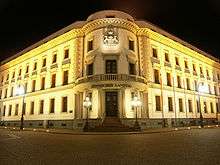
- Ducal Palace, Darmstadt, residence of the grand dukes of Hesse
- Orangery, Fulda
- Orangery, Kassel, residence of the electors of Hesse
- Philippsthal Orangery, Philippsthal
- Ducal Palace, Wiesbaden, residence of the dukes of Nassau
- Biebrich Palace, Wiesbaden
- Wilhelmshöhe Palace, Kassel, residence of the electors of Hesse
Lower Saxony
Mecklenburg-Vorpommern
- Güstrow Castle, a masterpiece of Renaissance architecture
- Schloss Bothmer, near Klütz
- Schloss Ludwigslust, former duke residence in Ludwigslust
- Schloss Neustrelitz, destroyed dukes palace of Neustrelitz
- Schloss Schwerin - seat of Mecklenburg-Vorpommern state parliament in its capital city, Schwerin
North Rhine-Westphalia
- Electoral Palace, Bonn, residence of the archbishop-electors of Cologne
- Schloss Benrath, Düsseldorf, residence of the electors Palatine
Rhineland-Palatinate
- Electoral Palace, Mainz
- Kurfürstliches Palais, Trier
Saxony
Thuringia
- Altenburg Castle, Altenburg, residence of the dukes of Saxe-Altenburg
- Schloss Friedenstein, Gotha, residence of the dukes of Saxe-Gotha
- Schloss Elisabethenburg, Meiningen, residence of the dukes of Saxe-Meiningen
- Heidecksburg, Rudolstadt, residence of the princes of Schwarzburg-Rudolstadt
- Sondershausen Palace, Sondershausen, residence of the princes of Schwarzburg-Sondershausen
- Grand Ducal Palace, Weimar, residence of the grand dukes of Saxe-Weimar
Ghana
- The Manhyia Palace (Asantehene's Palace) - Seat of the Asantehene of Ashanti, Kumasi
- The Flagstaff House (Presidential Palace)- Seat of Government until the late 1970s, Accra
- The Christianborg (Osu Castle) - former Seat of the Government till December 2008, Accra
- The Golden Jubilee Palace (Presidential Palace) formerly known as the "Flagstaff House" - Seat of Government since December 2008, Accra
Greece
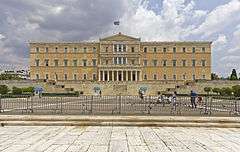
- Achilleion (Corfu)
- Old Royal Palace
- Thessaloniki Government House, known as the "Little Palace" (Macedonia)
- Mon Repos (Museum)
- New Royal Palace (First Crown Prince's Palace; now Presidential Residence)
- Palace of Saint Michael and Saint George, in Corfu (now the Sino-Japanese Museum)
- Palace of the Grand Master of the Knights of Rhodes (built from the knight hospitaliers in the 14th century)
- Polydendri (Thessaly)
- Psychiko (Crown Prince Paul & Crown Princess Frederica)
- Queen's Tower (King Othon & Queen Amalia)
- Tatoi (Estate Outside of Athens)
Haiti
- National Palace *demolished, 2 years after 2010 Haiti earthquake, plans to rebuilt has not been set or disclose* - residence of the President of Haiti
Hungary
- Buda Castle (Budapest) - former royal residence, now National Széchényi Library and National Gallery of Hungary
- Eszterháza (Fertőd) - Palace of the House of Esterházy
- Festetics Palace (Keszthely) - Palace of the Festetics Family near Lake Balaton
- Royal Castle of Gödöllő (Gödöllő) - former royal summer residence of the Hungarian Kings since 1867
- Sándor Palace (Budapest) - official residence and office of the President of the Republic of Hungary
India
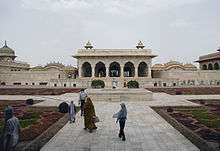
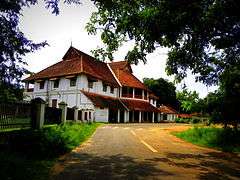
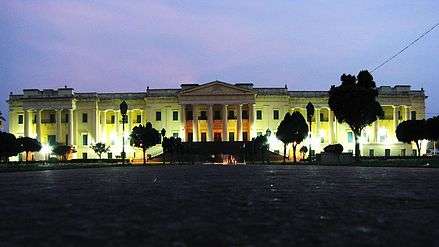
- Agra Fort - former royal residence of the Moghul, Agra
- Aina Mahal - royal residence of ruler of Kutch.
- Amber Palace (Amber Fort) - former royal residence, Jaipur
- Amba Vilas Palace–Mysore
- Arki Palace Himachal
- Bangalore Palace - Bengaluru
- Bilara Palace (Dist Jodhpur, Rajasthan
 Palace of Bilara View
Palace of Bilara View - Bhutan House - royal residence of the Dorji family, Kalimpong
- British Residency, Kollam - Architectural Marvel built by Col. John Munro
- Chatrapati Shahu palace - former royal residence of chatrapati shahu maharaj kolhapur
- Cheluvamba Vilas Palace-Mysore
- Chowmahalla Palace
- City Palace, Jaipur - Seat of the Maharaja of Jaipur
- City Palace, Udaipur - Seat of the Maharana of Udaipur
- Candra Mahal, Jaipur
- Chittorgarh Fort, Chittorgarh - Largest Fort in India
- Cooch Behar Palace - former royal residence, Cooch Behar
- Delhi Fort - former seat of the Moghul, Delhi
- Falaknuma Palace - royal residence, Hyderabad
- Fatehpur Sikri - former royal residence of Emperor Akbar
- Gohar Mahal - former royal residence, Bhopal
- Gorbandh Palace, Jaisalmer
- Grand Palace, Srinagar - former royal residence, today hotel, Srinagar
- Hawa Mahal (Palace of Winds) - former royal residence, Jaipur
- Hazarduari Palace - former royal residence, Murshidabad
- Hill Palace, Tripunithura, Cochin - former Royal Residence of Maharaja of Cochin, now one of the largest archaeological museums in India
- Jagan Mohan Palace-Mysore
- Jag Mandir - former residence of Shah Jahan, Udaipur
- Jag Niwas (Lake Palace) - former royal residence, Udaipur
- Jai Mahal - former royal residence, today hotel, Jaipur
- Jaya Lakshmi Vilas Palace-Mysore
- Jai Vilas Palace - Seat of the Maharaja of Gwalior
- Jaisalmer Fort - Seat of the Maharaja of Jaisalmer
- Jhargram Palace - royal residence & heritage hotel, Jhargram
- Karanji Vilas Palace-Mysore
- Kangra Fort - Seat of the Maharaja of Kangra-Lambagraon
- Kathgola - former estate of a zamindar (landowner), Murshidabad
- Khasbagh Palace - Palace of the Maharaja of Rampur
- King Kothi Palace - Palace of VII Nizam, Osman Ali Khan
- Kowdiar Palace- Residence of the Travancore Royal Family
- Lalgarh Palace - former royal residence, today hotel, Bikaner
- Laxmi Vilas Palace - Seat of the Maharajah of Baroda
- Laxmipuram Palace
- Lalitha Mahal Palace-Mysore
- Laxmi Vilas Palace (also known as Anandbagh Palace) - seat of the Maharaja of Darbhanga, donated to Kameshwar Singh Sanskrit University. Now houses office of Vice-Chancellor and other officials of the University.
- Lokranjan Mahal-Mysore
- Marble Palace (Kolkata) - former residence of Raja Rajendra Mullick, Kolkata
- Mattancherry Palace (Dutch Palace), Cochin - former Royal Residence of Maharaja of Cochin, archeological museum at present.
- Nashipur Rajbari - former royal residence, Murshidabad
- Narain Niwas Palace - former royal residence, today hotel, Jaipur
- Nedumpuram Palace
- New Palace - Seat of Maharaja of Kolhapur
- Padmanabhapuram Palace - Seat of the Maharaja of Travancore
- Prag Mahal - royal palace of rulers of Kutch
- Purani Haveli - Seat of the Nizam of Hyderabad
- Rajendra vilas Palace-Mysore
- Raj Mahal Palace - former royal residence, Jaipur (today hotel)
- Rajbari - Seat of the Maharaja of Cooch Behar
- Rambagh Palace - former residence of the Maharaja of Jaipur (today hotel)
- Rashtrapati Bhavan - Seat of the President, former viceregal residence, Delhi
- Red Fort - seat of many dynasties of India
- Samode Palace - former royal residence, today hotel, Jaipur
- Shaniwar Wada, Pune - royal residence of Peshwas
- Shaukat Mahal - former royal residence, Bhopal
- Thanjavur Nayak - Thanjavur (Tanjore) Nayak Palace, Thanjavur
- Thevally Palace, Kollam - Outhouse of erstwhile Travancore Kings
- Umaid Bhawan Palace - Seat of the Maharaja of Jodhpur
- Uparkot Fort - former seat of the Chudasama of Junagadh, Gujarat
- Vasanth Mahal Palace-Mysore
- Vijay Vilas Palace, Mandavi - royal residence of rulers of Kutch
- Wasif Manzil - former royal residence, Murshidabad
Indonesia



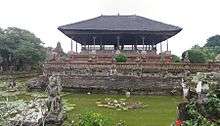
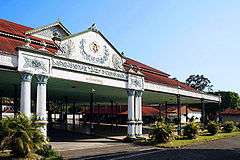
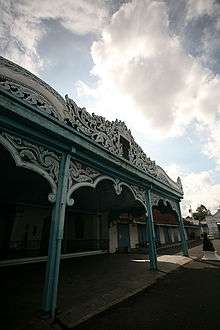
Presidential palaces
- Gedung Agung, The Presidential Palace in Yogyakarta.
- Istana Bogor, The Presidential Palace in Bogor.
- Istana Cipanas, The President's Leisure Palace in Puncak.
- Istana Merdeka, Jakarta, The President Official Residence.
- Istana Negara, Jakarta, The President Office.
- Istana Tampaksiring, The Presidential Palace in Bali.
- Istana Wakil Presiden, Jakarta, The Vice President Office.
Royal palaces
- Istana Al Mukarramah - Seat of Sintang Kingdom, Sintang Regency.
- Istana Al Watzikubillah - Seat of Sambas Sultanate, Sambas Regency.
- Istana Amantubillah - Seat of Mempawah Kingdom, Mempawah Regency.
- Istana Asahan (Bangunan Bersejarah - Balai Di Ujung Tanjung) - Seat of Asahan Sultanate, Kota Tanjung Balai.
- Istana Asi Mbojo - Seat of Bima Sultanate, Kota Bima.
- Istana Asseraya Al Hasyimiyah - Seat of Siak Sultanate, Siak Regency.
- Istana Bacan - Seat of Bacan Sultanate, South Halmahera Regency.
- Istana Bala Kuning - Seat of Sumbawa Sultanate, Sumbawa Regency.
- Istana Balla Lompoa - Seat of Gowa Sultanate, Gowa Regency.
- Istana Banggai - Seat of Banggai Sultanate, Banggai Islands Regency.
- Istana Datu Luwu - Seat of Luwu Kingdom, Kota Palopo.
- Istana Gunung Tabur - Seat of Gunung Tabur Sultanate, Berau Regency.
- Istana Indragiri - Seat of Indragiri Kingdom, Indragiri Hulu Regency.
- Istana Ismahayana - Seat of Landak Kingdom, Landak Regency.
- Istana Jailolo - Seat of Jailolo Sultanate, North Halmahera Regency.
- Istana Kadriyah - Seat of Pontianak Sultanate, Pontianak.
- Istana Kantor - Seat of Riau-Lingga Sultanate, Kota Tanjung Pinang.
- Istana Kubu - Seat of Kubu Kingdom, Kubu Raya Regency.
- Istana Kuning - Seat of Kotawaringin Sultanate, West Kotawaringin Regency.
- Istana Maimun - Seat of Deli Sultanate, Medan.
- Istana Malige - Seat of Buton Sultanate, Bau-Bau.
- Istana Mori - Seat of Mori Kingdom, Morowali Regency.
- Istana Muliakarta - Seat of Matan Kingdom, Ketapang Regency.
- Istana Niat - Seat of Limalaras Kingdom, Batubara Regency.
- Istana Paku Negara - Seat of Tayan Kingdom, Tayan Regency.
- Istana Rokan Hulu - Seat of Rokan Hulu Kingdom, Rokan Hulu Regency.
- Istana Sadurangas - Seat of Paser Belengkong Sultanate, Paser Regency.
- Istana Sambaliung - Seat of Sambaliung Sultanate, Berau Regency.
- Istana Sayap - Seat of Pelalawan Sultanate, Pelalawan Regency.
- Istana Serdang - Seat of Serdang Sultanate, Serdang Bedagai Regency.
- Istana Surya Negara - Seat of Sanggau Kingdom, Sanggau Regency.
- Istana Tanjung Palas - Seat of Bulungan Sultanate, Bulungan Regency.
- Istana Ternate - Seat of Ternate Sultanate, Ternate.
- Istana Tidore - Seat of Tidore Sultanate, Tidore.
- Istana Tunggang Bosar - Seat of Dhasa Nawalu Sultanate, South Tapanuli Regency.
- Istano Basa Pagaruyung - Seat of Pagaruyung Kingdom, Tanah Datar Regency.
- Istano Kuto Lamo - Seat of Palembang Darussalam Sultanate, Palembang.
- Kedaton Kutai Kartanegara - Seat of Kutai Kartanegara Sultanate, Kutai Kartanegara Regency.
- Kraton Kacirebonan - Seat of Kacirebonan Dynasty of Cirebon Sultanate, Cirebon.
- Kraton Kanoman - Seat of Kanoman Dynasty of Cirebon Sultanate, Cirebon.
- Kraton Kasepuhan - Seat of Kasepuhan Dynasty of Cirebon Sultanate, Cirebon.
- Kraton Ngayogyakarta Hadiningrat - Seat of Yogyakarta Sultanate, Yogyakarta.
- Kraton Sumedang Larang - Seat of Sumedang Larang Kingdom, Sumedang Regency.
- Kraton Sumenep - Seat of Sumenep (East Madura) Duchy, Sumenep Regency.
- Kraton Surakarta Hadiningrat - Seat of the Surakarta Sunanate, Surakarta.
- Pura Pakualaman - Seat of Pakualaman Duchy, Yogyakarta.
- Pura Mangkunegaran - Seat of Mangkunegaran Duchy, Surakarta.
- Puri Agung Bangli - Seat of Bangli Kingdom, Bangli Regency.
- Puri Agung Denpasar - Seat of Badung Kingdom, Denpasar.
- Puri Agung Gianyar - Seat of Gianyar Kingdom, Gianyar Regency.
- Puri Agung Karangasem - Seat of Karangasem Kingdom, Karangasem Regency.
- Puri Agung Klungkung - Seat of Klungkung Kingdom, Klungkung Regency.
- Puri Agung Negara - Seat of Jembrana Kingdom, Jembrana Regency.
- Puri Agung Singaraja - Seat of Buleleng Kingdom, Buleleng Regency.
- Puri Agung Tabanan - Seat of Tabanan Kingdom, Tabanan Regency.
- Puri Agung Ubud - Seat of Ubud Princedom, Gianyar Regency.
- Saoraja La Pinceng - Seat of Balusu Kingdom, Barru Regency.
- Saoraja Mallangga - Seat of Wajo Sultanate, Wajo Regency.
- Saoraja Petta Ponggawae - Seat of Bone Sultanate, Bone Regency.
- Sonaf Ba'a - Seat of Rote Kingdom, Rote Ndao Regency.
- Sonaf Baun - Seat of Amarasi Kingdom, Kupang.
- Sonaf Larantuka - Seat of Larantuka Kingdom, East Flores Regency.
- Sonaf Nisnoni - Seat of Kupang Kingdom, Kupang.
- Sonaf Oelolok - Seat of Taolin Kingdom, North Central Timor Regency.
- Sonaf Sonbesi - Seat of Amanuban Kingdom, South Central Timor Regency.
Iran
Palaces and pavilions
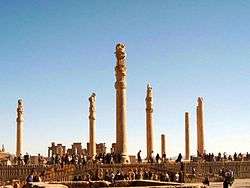
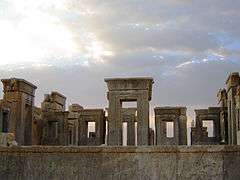
- Ali Qapu, former residence of the Safavid dynasty after Shāh Abbās I, in Isfahan
- Apadana in Persepolis
- Chehel Sotoun in Isfahan
- Chehel Sotoun of Qazvin in Qazvin
- East-Azerbaijan State Palace
- Gate of All Nations in Persepolis
- Golestan Palace, former residence of the Qajar dynasty, in Tehran
- Hasht Behesht in Isfahan
- Marble Palace in Tehran
- Niavaran Palace Complex, former residence of the Qajar and Pahlavi dynasties
- Palace of Ardashir in Firouzabad, south of Shiraz
- Sadabad Palace in Tehran, former residence of the Pahlavi dynasty
- Saheb Qarani Palace, where Naser al-Din Shah Qajar lived, in Tehran
- Tabriz Municipality Palace, the head office of the municipal government of Tabriz
- Tachara, one of the interior palaces in Persepolis
- Takht-e Soleymān in West Azerbaijan
- Throne Hall, second largest palace of Persepolis after the Apadana
- Tehran Municipality Palace, which was located on the north side of Tupkhaneh
Castles and citadels
- Alamut Castle, a mountain fortress in Gilan Province
- Arg e Bam in Bam
- Arg e Furg in South Khorasan
- Arg e Nehbandan in Birjand
- Arg e Ryan in Kerman
- Arg e Tabriz in Tabriz
- Arg e Tus in Tus
- Arshoq Castle in Mishgin
- Babak Castle on the top of a mountain in the Arasbaran forests
- Dežbār in Khorramabad
- Fort of Our Lady of the Conception in Hormuz Island
- Dezh Dokhtar in Kerman
- Markooh Fortress in Ramsar
- Meimoon Castle in Qazvin
- Narin Castle in Yazd Province
- Rudkhan Castle, a brick and stone medieval castle in Gilan Province
- Shush Castle in Hormuz Island
Iraq
Italy

.jpg)
Rome
- Palazzo Altemps
- Palazzo Barberini - It houses Galleria Nazionale d'Arte Antica
- Palazzo Borghese
- Palazzo Colonna
- Palazzo Corsini - Office of the Accademia dei Lincei
- Palazzo della Cancelleria - former papal palace
- Palazzo della Civiltà Italiana - Also known as 'Colosseo Quadrato' in EUR
- Palazzo dei Conservatori
- Palazzo di Venezia - former the Embassy of the Republic of Venice
- Palazzo Doria Pamphilj
- Palazzo Farnese - Now the French Embassy in Italy
- Palazzo Laterano - former papal residence, currently the seat of Diocese of Rome
- Palazzo Madama - Currently House of the Italian Senate
- Palazzo Montecitorio - Currently Lower House of Italian Parliament
- Palazzo Quirinale - Presidential Palace, former residence of the kings of Italy
- Palazzo Spada
Florence
- Bargello - Also known as the Palazzo del Popolo
- Palazzo Medici
- Palazzo Pitti - former seat of the Grand Duke of Tuscany
- Palazzo Rucellai
- Palazzo Strozzi
- Palazzo Uffizi
- Palazzo Vecchio - City Hall of Firenze
Venice
- Ca' d'Oro
- Ca' Foscari
- Ca' Rezzonico
- Ca' Vendramin Calergi - Now home of the Wagner Museum and Venice Casino
- Doge's Palace - former seat of the Doge of Venice
- Palazzo Barbarigo
- Palazzo Contarini del Bovolo
- Palazzo Dandolo
- Palazzo Grassi
- Palazzo Labia - Now the regional HQ of RAI (Radiotelevisione Italiana)
- Palazzo Malipiero
- Palazzo Venier dei Leoni - Now the Peggy Guggenheim Collection
Elsewhere
- Palazzo Re Enzo, Bologna
- Royal Palace of Caserta, Caserta (near Napoli) - former seat of the kings of Two Sicilies
- Papal Palace, Castel Gandolfo - Summer residence of the Pope
- Palazzo dei Diamanti, Ferrara - Currently houses 'Pinacoteca Nazionale'
- Palazzo Bianco, Genoa
- Torre e Palazzo de Félice, Rosciano - an 11th Century castle and former ancestral palace of the Counts di Panzutti of the de Félice family
- Palazzo de Félice, Somma Vesuviana - a 16th Century palace of the Counts di Panzutti of the de Félice family
- Palazzo de Félice, Grottaglie - an 18th Century palace of the Counts di Panzutti of the de Félice family
- Palazzo Pfanner, Lucca
- Palazzo del Te, Mantua - former seat of the Dukes of Mantua
- Palazzo Litta, Milan
- Castello Sforzesco, Milan - residence of the dukes of Milan
- Royal Villa of Monza, Monza
- Ducal Palace, Modena - residence of the dukes of Modena
- Royal Palace, Naples
- Royal Palace of Capodimonte, Naples - Summer palace of the kings of the Two Sicilies; today home to Museo di Capodimonte
- Palazzo dei Normanni, Palermo - former residence of Holy Roman Emperors and kings of Sicily
- Ducal Palace, Parma - residence of the dukes of Parma
- Ducal Palace of Colorno, Colorno
- Palazzo della Carovana, Pisa
- Palace of Portici, Portici
- Palazzo Pubblico, Siena
- Royal Palace of Turin, Torino - former residence of the dukes of Savoy and kings of Sardinia
- Palazzina di Stupinigi, Torino
- Palazzo Carignano, Torino
- Castello del Valentino, Torino
- Palazzo Ducale, Urbino - former seat of the Dukes of Urbino
- Palazzo Canossa, Verona
- Palazzo Chiericati, Vicenza
- Miramare Castle, Trieste
- Royal Palace of Carditello, near Caserta - hunting site and then a farm by of the kings of the Two Sicilies
Japan
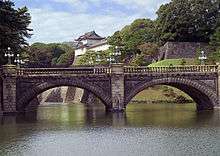
- Akasaka Palace (State Guest-House: 迎賓館), Tokyo & Kyoto
- Fukiage Omiya Palace - Imperial residence of the Empress Dowager, Tokyo
- Heijo Palace (平城京) - former capital, Nara
- Heian Palace, Kyoto
- Imperial Palace (皇居) - Imperial Court and Residence, Tokyo
- Katsura Detached Palace (Katsura Imperial Villa: 桂離宮) - former imperial palace, Kyoto
- Kyoto Imperial Palace (京都御所), Kyoto
- Kyoto Omiya Palace - Imperial residence, Kyoto
- Sento Imperial Palace - Imperial residence, Kyoto
- Shugaku-in Detached Palace (Shugaku-in Imperial Villa) - former imperial palace, Kyoto
- Rokuhara Yakata (六波羅館) and Nishihachijo House (西八条邸) - former residence of Taira no Kiyomori, Kyoto.
- Yukimi Imperial Palace (雪見御所) - former residence of Taira no Kiyomori, Fukuhara-kyō.
- Yanagi no Gosho (柳之御所) - former residence of Northern Fujiwara, Hiraizumi, Iwate.
- Kyara Gosho (伽羅御所) - former residence of Northern Fujiwara, Hiraizumi, Iwate.
- Okura Imperial Palace (大倉御所) - former residence of Kamakura shogunate.
- Utsunomiya Zushi Imperial Palace (宇都宮辻子御所) - former residence of Kamakura shogunate.
- Wakamiya Oji Imperial Palace (若宮大路御所) - former residence of Kamakura shogunate.
- Sanjo Bomon Dono (三条坊門殿) - former residence of Ashikaga shogunate, Kyoto.
- Hana no-gosho (花の御所) - former residence of Ashikaga shogunate, Kyoto.
- Azuchi Castle (安土城) - former residence of Oda Nobunaga, Ōmihachiman,Shiga Prefecture.
- Osaka Castle (大坂城) - former residence of Kampaku Toyotomi Hideyoshi, Osaka.
- Jurakudai (聚楽第) - former residence of Kampaku Toyotomi Hideyoshi, Kyoto.
- Edo Castle (江戶城) - former residence of Tokugawa shogunate, Tokyo.
- Nijo Palace (Nijo Castle: 二条城) - former palace, Kyoto
- Shuri Castle (首里城) - former seat of the Kings of Ryūkyū, Naha
Jordan
Raghadan Palace, Amman. Royal Residence of the Hussein Family
Korea


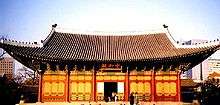
- Goguryeo
- Annak Palace, Pyeongyang
- Palace site, Jian, Jilin
- Baekje
- Sabi Palace site, Buyeo
- Ungjin Palace site, Gongju
- Silla
- Anapji (Eastern Palace), Gyeongju
- Banwolseong, Gyeongju
- Balhae
- Taebong
- Gungye palace site, Cheolwon
- Goryeo
- Joseon
- Deoksugung, Seoul
- Changdeokgung, Seoul
- Changgyeonggung, Seoul
- Gyeongbokgung, Main royal palace, Seoul
- Gyeonghuigung, Seoul
Kuwait
- Sief Palace- official residence of the head of state
Laos
- Haw Kham (Royal Palace) - former residence of Lao royal family, Luang Prabang
Latvia
- Bīriņi Palace
- Cesvaine Palace
- Cīrava Palace
- Kazdanga Palace
- Krāslava New Palace
- Laidi Palace
- Mežotne Palace
- Mitava Palace of the Dukes of Courland
- Pope Palace
- Preiļi Palace
- Rundale Palace of the Dukes of Courland
- Snēpele Palace
- Stāmeriena Palace
- Varakļāni Palace
- Vērgale Palace
Lebanon
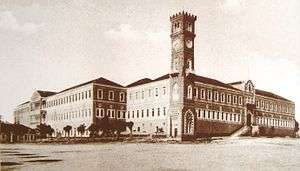
- Baabda Palace (Presidential Palace)
- Beiteddine Palace (Palace of Lebanese Kings until the fall of the Ottoman Empire)
- Bustros Palace
- Fakhreddine Palace (Palace of Lebanese King Fakhreddine)
- Grand Serail (Prime minister Headquarters)
- Petit Serail
- Pine Palace
- Robert Mouawad Palace (Currently a Museum)
- Sursock Palace (Currently a Museum)
- Ziade Palace
Lithuania
- Historical Presidential Palace, Kaunas
- Presidential Palace, Vilnius
- Radziwill Palace, Vilnius
- Royal Palace in Vilnius (being rebuilt)
- Sapieha Palace in Vilnius
- Slushko Palace in Vilnius
- Tiškevičiai Palace, Palanga
- Tyzenhaus Palace in Vilnius
- Vileišis Palace, Vilnius
Luxembourg
Malaysia
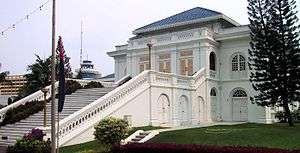
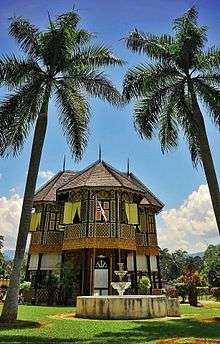
- Istana Alam Shah - The Sultan of Selangor's official residence in Klang
- Istana Ampang Tinggi was commissioned by the 5th Yamtuan of Negri Sembilan, Yamtuan Ulin Ibni Almarhum Yamtuan Hitam. The palace was built between 1865 and 1870 at Ampang Tinggi ("High Dam") in Kuala Pilah
- Istana Anak Bukit - Residential palace for the Sultan of Kedah
- Istana Badariah
- Istana Balai Besar - The palace was built by Sultan Muhamad 11 in 1840 in Kelantan
- Istana Bandar - A big palace made of wood and marble built for The fifth Sultan of Selangor, Sultan Alauddin Sulaiman
- Istana Batu - the Royal Museum is located in the middle of the Kota Bharu, Kelantan. The design of the palace was inspired by HRH Sultan Ismail Ibni Almarhum Sultan Muhammad IV who reigned from 1920 to 1944.
- Istana Besar - Istana Besar is a royal palace of the Sultan of Johor which is located in Johor Bahru
- Istana Bukit Kayangan - The Sultan of Selangor's state palace in Shah Alam
- Istana Bukit Serene - The Sultan of Johor's palace in Johor
- Istana Hinggap - a resting palace of the Sultan of Johor which is located in Segamat
- Istana Hulu - The palace, designed with a mixture of Western neo-classical and Islamic styles, was built in 1903 for the 28th Sultan of Perak.
- Istana Iskandariah - The official residence of all the Sultans of Perak who have been installed since its completion in 1933. The palace is named after Sultan Iskandar Shah (1918–1938) who initiated its construction.
- Istana Jahar - Built in 1887, Istana Jahar was a gift from Sultan Mahmud II to his grandson, Long Kundur. Today, this palace is known as the Museum of Royal Traditions and Customs Kelantan
- Istana Jugra
- Istana Kenangan- The Perak Royal Museum was built as a royal residence in 1926. It is an amazing architecture which was built from woods without a single nail.
- Istana Kota Lama - Old royal palace of Kelantan
- Istana Kuning - Old residential palace for the Sultan of Kedah
- Istana Maziah is believed to have been constructed during the reign of Sultan Zainal Abidin Ill in Terengganu. It was built in 1897 to replace the lstana Hijau
- Istana Melawati - Second national palace, located in Putrajaya
- Istana Mestika - The official residence of the crown prince of Selangor, also in Shah Alam
- Istana Negara - Royal residence of the King of Malaysia, Kuala Lumpur
- Istana Nur Nadhirah
- Istana Pasir Pelangi - a royal palace of the Tengku Mahkota(crown prince) of Johor
- Istana Pelamin- or Istana Kota Setar. Currently the Kedah Royal Museum
- Istana Sri Menanti - Istana Seri Menanti was the official residence of the Negeri Sembilan royal family until 1931 and was turned into a Royal Museum in 1992
- Kellie's Castle was meant to be a home away from home for Scottish Planter, William Kellie Smith in the 19th century in Perak
- The Astana- Currently the official residence of the Yang di-Pertua Negeri, the Governor of Sarawak.The second Rajah, Charles Brooke, built this palace in 1870
Mexico

- Government Palace of Chihuahua, Chihuahua - Seat of the Government of the State of Chihuahua
- Palacio de Alvarado, Chihuahua - House of one of the richest silver barons in Mexico.
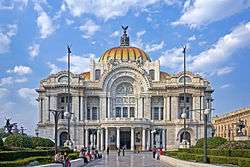
- Castillo de Chapultepec, Mexico City - former Imperial residence and Presidential Palace, military academy, and currently, home of the Museo Natural de Historia.
- Palace of San Lázaro, Mexico City - House of the Congress of Mexico.
- Los Pinos Official Residence, Mexico City - Official residence of the President of Mexico.
- National Palace, Mexico City - former Viceregal and Presidential Palace; currently serves as the seat of the executive, and houses State ceremonies, such as receptions, banquets, and the Independence celebration.
- Palacio de Bellas Artes, Mexico City
- Palacio de Correos de Mexico, Mexico City
- Palace of Iturbide, Mexico City
- Palacio de Minería, Mexico City
- Museo Nacional del Arte, Mexico City
- Hospicio Cabañas, Guadalajara - Colonial building which housed the city hospital during the Viceroyalty; a UNESCO world heritage site.
- Palace of Government, Monterrey - Seat of the Government of Nuevo León.
- Palacio del Obispado, Monterrey
- Castillo de San Juán de Ulúa, Veracruz - former Viceregal and Presidential residence. Later served as a prison. Currently houses a museum.
- Palacio Canton, Mérida- Now serves as a museum
Monaco

- The Prince's Palace - Seat of the Prince of Monaco
Mongolia
- Winter Palace - former residence of the Bogd Khan, Ulan Bator
Myanmar
- Mya Nan San Kyaw (The Royal Emerald Palace) - former seat of the Konbaung Dynasty, Mandalay
- Kanbawzathadi Palace The former seat of Bayinnaung
- Mrauk U Palace, the former seat of the Mrauk U based Arakanese Kingdom from 1431 to 1785.
Nepal
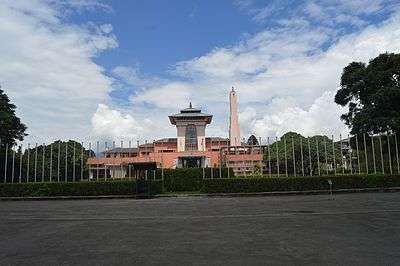
- Bagh Durbar
- Bhaktapur Durbar
- Gorkha Durbar
- Hanuman Dhoka Palace
- Hetauda Durbar
- Kakani Durbar
- Lal Durbar
- Lumjung Durbar
- Nagarjun Durbar
- Narayanhity Royal Palace - scene of the 2001 Nepalese royal massacre
- Nuwakot Durbar
- Palpa Durbar
- Patan Durbar
- Rani Mahal
- Seto Durbar
- Sinduligadi Durbar
- Singha Durbar
- Tangaal Durbar
- Thapathali Durbar
The Netherlands

- Bronbeek - Former royal residence, Arnhem
- Het Loo (Paleis het Loo) - Former royal residence, Apeldoorn
- Huis ten Bosch Palace - Royal residence, The Hague
- Kasteel Drakestein - Private royal residence, Baarn
- Noordeinde Palace (Paleis Noordeinde) - Royal residence, The Hague
- Royal Palace of Amsterdam (Koninklijk Paleis Amsterdam or Paleis op de Dam) - Royal residence, Amsterdam
- Soestdijk Palace (Paleis Soestdijk) - Former royal residence, Soestdijk
- Kneuterdijk Palace (Paleis Kneuterdijk) - Former royal residence, The Hague
- Lange Voorhout Palace (Paleis Lange Voorhout) - Former royal residence, The Hague
- Peace Palace (Vredespaleis) - Houses the international court of justice (judicial body of the United Nations), The Hague
New Zealand
- Tūrangawaewae - Official residence of the head of the Māori King Movement currently King Tuheitia Paki. The complex consists of Mahinarangi, Turongo and other substantial buildings used by the Kingitanga for a number of larger Iwi gatherings.
Apart from the large complex at Turangawaewae Marae located in the town of Ngaruawahia, the previous Māori Monarch Te Atairangikaahu had a home at Waahi Marae in Huntly where she lived for most of her 40-year reign with her consort Whatumoana Paki. The Māori King or Queen are required to attend 33 Poukai annually conducted at Marae loyal to the Kingitangi movement. Many of these Marae maintain residences for the Māori King or Queen for them to use during such visits.
Nigeria
- Olowo Palace in Owo Ondo State which contains more than one hundred courtyards, each with a unique traditional function.
Norway
- Royal Palace, Oslo (Slottet) - Royal residence
- Oscarshall - Royal summer residence
- Ledaal - Official residence of the King of Norway in Stavanger
- Stiftsgården
Oman
- Al Alam Palace - Royal Residence
- Bait Barka - Sultans Retreat in Barka
- Hisn Salalah - The Sultans main waterfront Royal complex residence in Salalah
- Hisn Seeb - Sultans Farm in Seeb which contains hundreds of pure bred Arabian Horses.
- Mamoora Palace - One of Sultans Ranch in Salalah
- Razat Farm - Sultans farm in Salalah adjacent to Mamoora Palace
- Sohar Palace - Sultans Ranch in Sohar
- Jibreen palace - Was Imam bularab bin sultan's summer retreat.
- Bait al falaj - former royal residence.
- Hamed bin mohammed palace - residence of hamed bin mohammed desigsed by the famous fareesh al ustadh
- Awlad seif palace - residence of salim bin seif.
- Awlad Murshed palace - Designed by fareesh al ustadh
- awlad al Maleel palace - residence of saeed bin salim walad al maleel.
Pakistan
- Aiwan-e-Sadr - Islamabad
- Mohatta Palace - Karachi
- Sadiq Garh Palace -Bahawalpur
- Gulzar Mahal - Bahawalpur
- Farukh Mahal - Bahawalpur
- Nishat Mahal - Bahawalpur
- Dubai Mahal - Bahawalpur
- Noor Mahal - Bahawalpur
- Omar Hayat Mahal - Jhang
- Raiwind Palace - Lahore
- Omar Hayat Mahal - Chiniot
- Sheesh Mahal (Lahore) - Lahore
- Derawar Fort - Bahawalpur
- Darbar Mahal - Bahawalpur
- Lal Haveli - Rawalpindi
- Ranikot - Sindh
- Bedi Mahal - Rawalpindi
- Shahi Qila - Lahore
- Faiz Mahal - Khairpur
- Bala Hissar - Peshwar
Paraguay
- Mburuvichá Roga House, Paraguayan Presidential Residence - (Asunción)
- Palacio de los López, Paraguayan Seat of Government - (Asunción)
Peru
- Archbishop Palace, Lima - Sear of the Roman Catholic Archdiocese of Lima
- Government Palace, Lima - Peruvian Seat of Government and home to the executive branch.
- Legislative Palace, Lima - Seat of the Congress of Peru
- Machu Picchu, Cusco - An Inca Palace, now a major tourist destination.
- Osambela House, Lima - Colonial palace in the Historic center of Lima
- Palace of Justice, Lima - Seat of the Supreme Court of Peru
- Torre Tagle Palace, Lima - headquarters of the Ministry of Foreign Relations of Peru
Philippines
- Torogan - Classical period residences for Hari, Raja's Datu's and Sultan's.
- Coconut Palace
- Malacañan Palace - the official residence of the President of the Philippines, Manila
- Malacañan sa Sugbo - the Presidential residence in Cebu City
- The Mansion, Baguio - the Presidential residence in Baguio
- Palacio del Gobernador - historical official residence, now used as a government building
- Archbishop's Palace - historical residence of the Arzobispo de Manila in Intramuros
- Archbishop's Palace - current residence of the Arzobispo de Manila in Villa San Miguel, Mandaluyong City.
- Archbishop's Palace - temporary residence of the Archbishop of Manila in the past, located in San Fernando, Pampanga
- The Astana Putih or The Sultan's Palace - Original residence of the Sultan of Sulu located in Maimbung, Sulu.
Poland
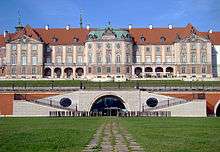

- Abbot's Palace (Oliwa), Gdańsk
- Branicki Palace, Białystok
- Drogosze Palace, Drogosze
- Gorzeński Palace, Śmiełów
- Jabłonna Palace
- Kozłówka Palace
- Kurozwęki Palace
- Kielce Palace, Kielce
- Lipnik Palace, Bielsko-Biała
- Lancut Palace, Łańcut
- Nieborów Palace
- Pszczyna Palace
- Radomicki Palace, Konarzewo, Poznań County
- Radziwiłł Palace, Antonin near Ostrzeszów
- Rydzyna Palace
- Tęgoborze Palace
- Włodowice Palace
- Wrocław Palace
- Żyrowa Palace, Żyrowa
Warsaw
- Belweder - former seat of the President, Warsaw
- Czapski Palace, Warsaw
- Krasiński's Palace, Warsaw
- Królikarnia, Warsaw
- Myślewicki Palace, Warsaw
- Natolin, Warsaw
- Ostrogski Palace, Warsaw
- Presidential Palace, Warsaw - Seat of the President
- Palace of the Four Winds, Warsaw
- Royal Castle, Warsaw - former royal palace
- Sapieha Palace in Warsaw
- Staszic Palace, Warsaw
- The Palace in Łazienki Park, Warsaw
- Saxon Palace, Warsaw
- Tin-roofed Palace, Warsaw
- Ujazdowski Castle
- Wilanów Palace - former summer palace of the King of Poland
Portugal
Alentejo
Beira
- Paço de Sobre-Ribas
- Solar dos Cancelos
- Solar do Visconde de Almendra
- Palácio de Reriz
- Buçaco Palace
- Palácio dos Figueiredos
- Palácio Sotto Maior
- Palácio do Conselheiro Branco
- Palácio da Lousã
- Palácio Landal
Douro Litoral
- Palacete de Belomonte
- Palácio da Bolsa
- Palácio das Cardosas
- Palácio dos Carrancas
- Palácio do Bolhão
- Palácio do Freixo
- Episcopal Palace of Porto
- Palacete Pinto Leite
- Palácio de São Bento da Vitória
- Palácio de São João Novo
- Palácio dos Terenas
- Palacete dos Viscondes de Balsemão
Minho
- Episcopal Palace of Braga
- Paço de Lanheses
- Castle of D. Chica
- Biscainhos Museum
- Palace of the Dukes of Braganza
- Paço de São Cipriano
- Palácio Vila Flor
- Palácio Igreja Velha
Estremadura
- Ajuda National Palace - former royal palace
- Beau-Séjour Palace
- Belém Palace - former royal palace; seat of the President of Portugal
- Bemposta Palace - former royal palace
- Burnay Palace
- Correio-Mor Palace - former seat of the High-Couriers of the Kingdom
- Estaus Palace
- Galveias Palace
- Mafra National Palace - former royal palace
- Monserrate Palace
- Palace of Necessidades - former royal palace; seat of the Ministry of Foreign Affairs (Portugal)
- Palace of the Counts of Azambuja
- Palace of the Counts of Penafiel
- Palace of the Counts of Redondo
- Palácio dos Condes da Calheta
- Palace of the Dukes of Palmela
- Palace of the Marquesses of Fronteira
- Pena National Palace - former royal palace
- Pimenta Palace
- Queluz National Palace - former royal palace
- Ribeira Palace - former royal palace
- São Bento Palace - seat of Portuguese Parliament
- Seteais Palace
- Sintra National Palace - former royal palace
- Sotto Mayor Palace
- Verride Palace
- Palácio dos Condes de Castro Guimarães
- Palácio Ludovice
- Palácio da Rosa
- Quinta da Regaleira
- Palácio da Bacalhoa
Trás-os-Montes e Alto Douro
- Palácio dos Pimentéis
- Mateus Palace
- Paço dos Távoras
Azores and Madeira Archipelagos
- Palácio de São Lourenço
- Palace of the Bettencourts
- Palácio de Sant'ana
Puerto Rico
Qatar
- Al Rayyan Palace
- Al Wukair Palace
- Markhiya Palace
- Barzaan Palace
- Doha Palace
- Diwan Emiri Palace
- al Bidda Palace
- Umm Salal Palace
- Al Wajba Palace
- Al Gharafa Palace
- Al Jassasiya Palace
- Al Mirgab Palace
- Al Waab Palace
Romania
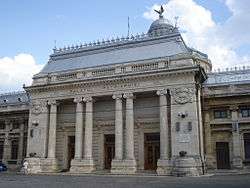
- Apollo Palace - Târgu Mureş
- Banffy Palace - Cluj-Napoca, built 1791.
- Baroque Palace of Oradea - Founded in 1762 as the district Bishopric Palace.
- Baroque Palace, Timişoara
- Berde Palace, Cluj-Napoca
- Black eagle palace - Oradea
- Brukenthal National Museum - An 18th century urban palazzo of Baron Brukenthal in Sibiu.
- Dauerbach Palace - Timişoara
- Dejan Palace, Timişoara
- Dicasterial Palace, Timişoara
- Dinu Mihail Palace - Craiova, today a museum.
- Finance Palace - Cluj-Napoca
- Ghica family Palace - Built in 1880, late Baroque, located in Bacău district.
- Löffler Palace, Timişoara
- Mogoşoaia Palace - Near Bucharest, founded 1698, built in Romanian Renaissance style.
- Orthodox Archiepiscopal Palace - Cluj-Napoca
- Palace of Culture (Iaşi) - built over Royal Court of Moldavia, during Carol I.
- Palace of Justice, Cluj-Napoca
- Patriarchal Palace - Founded 1653, home for Romanian Orthodox heads of church. Also known as Palace of the Chamber of Deputies.
- Peles Castle - former Sinaia summer residence of Romanian royal family.
- Pelisor - On the grounds of Peles Castle.
- Postal Palace, Cluj-Napoca
- Prefecture Palace, Cluj-Napoca
- Reduta Palace, Cluj-Napoca
- Regional Railways Palace, Cluj-Napoca
- Roznoveanu Palace - Since the 1770s, baroque palace in Iași.
- Ruginoasa Palace - small neogothic palace built in 1811, home of Sturdza family and Prince Cuza.
- Szechenyi Palace, Timişoara
- Szeky Palace, Cluj-Napoca
- Urania Palace, Cluj-Napoca
Bucharest
- Cantacuzino Palace - Today George Enescu Museum, Bucharest.
- CEC Palace, Bucharest - Palace of National Savings Bank, baroque, 1896.
- Cotroceni Palace - Seat of the President, former Royal Palace, Bucharest, built for King Carol I of Romania in 1888, on a 1679 foundation.
- Creţulescu Palace - Bucharest
- Palace of Justice- Founded 1890, neo-Renaissance, Bucharest.
- Palace of the Parliament, Bucharest - Absolute largest palace of the world.
- Romanian National Museum of History- Founded 1894, in Bucharest, former Postal Palace, neoclassic.
- Sutu Palace - Founded 1833 by Costache Sutu, today Museum of Bucharest.
- The Royal Palace - Now National Museum of Art of Romania, Bucharest
Russia

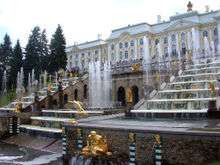
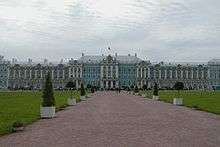
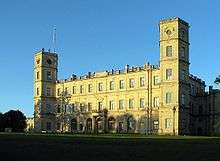
Gatchina
Moscow
- Catherine Palace
- Grand Kremlin Palace
- Kolomenskoye palace
- Kuskovo Palace
- Meyendorff Castle
- Ostankino Palace
- Palace of Facets
- Terem Palace
- Tsaritsyno palace
Oranienbaum
Pavlovsk
Pella
Peterhof
Pushkin
Saint Petersburg
- Anichkov Palace
- Beloselsky-Belozersky Palace
- Constantine Palace
- Marble Palace
- Marie Palace
- Menshikov Palace
- St Michael's Castle
- New Michael Palace
- Nicholas Palace
- Stone Island Palace
- Stroganov Palace
- Shuvalov Palace
- Old Summer Palace
- New Summer Palace
- Tauride Palace
- Vladimir Palace
- Vorontsov Palace
- Winter Palace - Winter residence of the Czars
- Yelagin Palace
- Yusupov Palace
Taganrog
Tver
Yalta
Rwanda
- Ibwami - former royal court, Nyabisindu
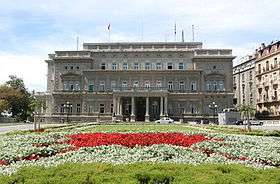
Serbia
- Royal Compound
- White Court - One of the residences of the House of Karađorđević, Belgrade
- Old Palace - Royal Palace of the Obrenović dynasty, Belgrade
- Prince Miloš's Residence
- Princess Ljubica's Residence
- Despot Stefan Tower - Medieval Serbian Palace
- Palace of Serbia
- Captain Miša's Mansion
Singapore
- Istana Singapore - Seat of the President of Singapore
- Istana Tyersall - An abandoned house which used to belong to the Sultan of Johor
Sri Lanka
- Sigiriya - former royal residence & court of King Kasyapa
- Royal Palace of Kandy - last royal residence, Kingdom of Kandy
South Africa
- Palace of Justice - the magistrates court of Pretoria
- uMgungundlovu - royal kraal of King Dingane of the Zulu Empire.
Sweden
- Drottningholm Palace - Private residence of the Swedish royal family, Drottningholm
- Gripsholm Castle - Royal residence, Mariefred
- Palace of Bonde - former noble residence, today seat of the Supreme Court, Stockholm
- Rosendal Palace - Royal residence
- Rosersberg Palace - Royal residence
- Stockholm Palace (Stockholms slott) - Royal residence
- Strömsholm Palace - Royal residence
- Tullgarn Palace - Royal residence
- Ulriksdal Palace - Royal residence
- Skoklosters slott - former noble residence, today museum
Scania
The province of Scania in southernmost Sweden is well known for its many castles.
- Malmöhus Castle, Malmö
- Landskrona Citadel, Landskrona (includes one of the worlds best preserved moat system)
- Kärnan, Helsingborg, very old tower from 12:th century
- Glimmingehus, close to Simrishamn
- Sofiero, Helsingborg, summer residence of king Gustav VI Adolf
- Trolleholm Castle, close to Eslöv
- Trollenäs Castle, also close to Eslöv
- Örenäs Castle, the youngest castle in Sweden, from 1903
- Krapperup Castle, close to Höganäs
- Svaneholm Castle
- Christinehof Castle
- Bosjökloster
- Övedskloster Castle
- Kulla Gunnarstorp Castle
- Vrams Gunnarstorp Castle
- Borgeby Castle
- Trolle-Ljungby Castle
Spain
_18.jpg)
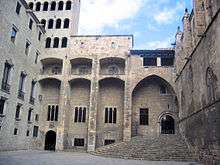
.jpg)
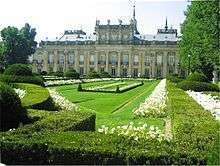
- Alcázar of Segovia
- Aljafería, (Zaragoza)
- Alhambra, Nasrid Palaces of La Alhambra
- Archbishop's Palace of Alcalá de Henares
- Buenavista Palace (Málaga)
- Casa de Pilatos, (Sevilla)
- Casa de las Torres
- Casa Salazar (La Laguna)
- Casa Solans
- Condes de Argillo Palace, (Morata de Jalón)
- Ducal Palace, (Lerma)
- El Escorial, Madrid
- Goyeneche Palace, (Nuevo Batzán)
- Liria Palace, (Madrid)
- Magalia Castle-Palace, (Las Navas del Marqués)
- Magdalena Palace, (Santander)
- Monasterio de las Descalzas Reales
- Olite Real Palace. Palace of the king of Navarre.
- Palaces and Royal Residences (Casa Real de España)[69]
- Palacio Argensola
- Palacio de Almanzora
- Palacio de Arbaizenea
- Palacio de Ayerbe
- Palacio de la Aduana
- Palacio de Comunicaciones de Madrid
- Palace of Charles V
- Palacio de las Cigüeñas
- Palacio de los Condes de Gomara (Soria)
- Palace of the Countess of Lebrija (Sevilla)
- Palace of Condes de Cirat, (Almansa)
- Palace of las Dueñas
- Palacio de las Dueñas (Sevilla)
- Palacio Duque de Abrantes
- Palacio Episcopal de Astorga
- Palacio Episcopal de Cáceres
- Palacio de Fuenclara, (Zaragoza)
- Palacio de los Golfines de Abajo
- Palacio de los Guzmanes
- Palace of Infante don Luis, (Boadilla del Monte)
- Palace of Infantado, (Guadalajara)
- Palacio Longoria
- Palacio del Marqués de Ferrera (Avilés)
- Palacio del Maruqués de Santa Cruz, (Viso del Marques)
- Palau Reial Major, Barcelona
- Palacio Real de Aranjuez, Madrid
- Palacio Real de El Pardo, Madrid
- Palacio Real de Miramar, San Sebastián
- Palacio de la Moncloa, the residence of the Prime Minister.
- Palacio Real de La Almudaina
- Palacio Real de La Granja de San Ildefonso
- Palacio Real de Riofrío
- Palace of San Telmo, Seville
- Palace of Sobrellano, (Comillas)
- Palacio de Yanduri (Sevilla)
- Palacio de la Zarzuela - Private residence of the Monarchs of Spain
- Palau de la Generalitat de Catalunya
- Palau Güell
- Real Monasterio de La Encarnación
- Real Monasterio Santa Clara de Tordesillas
- Real Monasterio Santa María La Real de las Huelgas
- Royal Palace of Madrid - Official residence of the Monarchs of Spain; and largest royal palace in Western Europe
- Royal Alcazars of Seville
- Valladolid Royal Palace
Slovakia
- Esterházy Palace, Bratislava - home to the Slovak National Gallery
- Grassalkovich Palace, Bratislava - seat of the President
- Johann Pálffy Palace, Bratislava - home to the Bratislava City Gallery
- Mirbach Palace, Bratislava - home to the Bratislava City Gallery
- Pálffy Palace, Bratislava
- Primate's Palace, Bratislava - seat of the city government and place of the Treaty of Pressburg in 1805
- Summer Archbishop's Palace, Bratislava
Syria
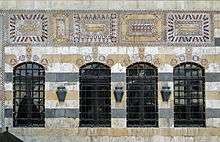
- Presidential Palace, Damascus
- Tishreen Palace, Damascus
- Azm Palace, Damascus
- Azm Palace, Hama
- Qasr al-Hayr al-Gharbi
- Qasr al-Hayr al-Sharqi
- Royal Palace of Mari
- Royal Palace of Ugarit
Taiwan
.jpg)


- Fort Zeelandia - former residence for Governor of Dutch Formosa and Prince of Yanping under the Kingdom of Tungning, Tainan.
- Fort San Domingo and Fort San Salvador - Governor of Spanish Formosa.
- Qing Dynasty Taiwan Provincial Administration Hall - former site of the Qing dynasty government yamen that ruled Taiwan.
- Presidential Office Building, Taipei - originally built as the Office of the Governor-General of Taiwan during the period of Japanese rule
- Taipei Guest House - former Governor-General of Taiwan's Residence
- Shilin Official Residence - residence of President Chiang Kai-shek
- Seven Seas Residence - residence of President Chiang Ching-kuo
- Official Residence of the President of the Republic of China - de facto official residence since President Lee Teng-hui
Thailand
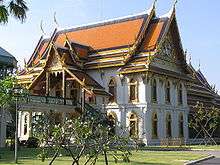
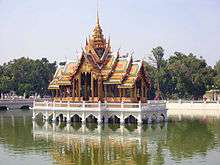
* Ancient Grand Palace - Ayutthaya Palace, Ayutthaya
- Baan Puen Palace - Phetchaburi
- Bang Pa-In Royal Palace - Summer Palace, Ayutthaya
- Bang Khun Phrom Palace - Currently, as the Bank of Thailand, Bangkok
- Bhuban Palace - Royal residence, Sakon Nakhon Province
- Bhubing Palace - Royal residence, Chiang Mai
- Burapha Phirom Palace - Currently, as a market, Bangkok
- Chakrabongse Palace - Currently, as a private resort, Bangkok
- Chakri Bongkot Palace - Private residence of the Thai royal family, Bangkok
- Chankasem Palace
- Derm Palace or Thon Buri Palace - It was the palace of King Taksin, now used as HQ of Royal Thai Navy
- Doi Tung Palace - Royal residence, Chiang Rai
- Dusit Palace - Private residence of the Thai royal family, Bangkok
- Chitralada Palace (New Palace) - Private residence of the Thai royal family, Bangkok
- Vimanmek Palace (Vimanmek Mansion) - former royal residence, Bangkok
- Front Palace - Currently, as Bangkok National Museum, Bangkok
- Grand Palace, Bangkok - Official residence of the King of Thailand, Bangkok
- King Narai's Palace - Lopburi
- Klai Kangwon Palace - Royal residence, King Rama IX likes there, Hua Hin
- Le Dix Palace - Private residence of the Thai royal family, Bangkok
- Marukatayawan Summer Palace - Phetchaburi
- Nakorn Luang Palace - Nakorn Luang, Ayutthaya
- Nonthaburi Palace - former private residence of the Thai royal family, Bangkok
- Phanakornkiri Palace - Phetchaburi
- Phetchabun Palace - Currently, as CentralWorld, Bangkok
- Phya Thai Palace - Bangkok
- Rear Palace - It is now a part of Siriraj Hospital, Bangkok
- Sanamchan Palace - King Rama VI's Palace, Nakhon Pathom
- Saranrom Palace - Currently, as a Saranrom Park, Bangkok
- Siriyalai Palace - - Private residence of the Thai royal family, Ayutthaya
- Srapratum Palace - Private residence of the Thai royal family, Bangkok
- Suan Pakard Palace - Currently, as a museum, Bangkok
- Sukhothai Palace - Private residence of the Thai royal family, Bangkok
- Taksin Palace - Royal residence, Narathiwat Province
- Thapra Palace - Currently, as a university, Bangkok
- Tuk Palace - Ayutthaya Palace, Ayutthaya
- Waradit Palace - Currently, as a museum, Bangkok
Tonga
- Royal Palace, Tonga-Royal Palace of the Kingdom of Tonga is located in the northwest of the capital, Nukuʻalofa, close to the Pacific Ocean.
Turkey
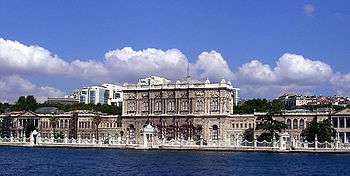
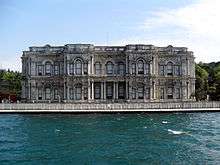
In Turkish, a palace is a Saray.
- Adile Sultan Palace - former royal residence
- Aynalıkavak Palace - former royal summer residence
- Beylerbeyi Palace - former royal residence
- Çırağan Palace - former royal residence, today hotel
- Dolmabahçe Palace - former residence of the Ottoman Royal Family, today state-guest house
- Feriye Palace - former royal residence
- Hatice Sultan Palace - former residence of Hatice Sultan
- Ihlamur Palace - former royal summer residence
- İbrahim Paşa Palace - former royal residence
- Khedive Palace - former royal summer residence
- Küçüksu Palace - former royal summer residence
- Maslak Palace - former royal summer residence
- Tophane Palace - former royal residence
- Topkapı Palace - former residence of the Ottoman sultans
- Yıldız Palace - former royal residence
Turkmenistan
Ukraine
- Kiev
- Klovsky Palace
- Mariyinsky Palace - Residence of the President of Ukraine
- Crimea
- Dnipropetrovs'k
- Potemkin's Palace
- Lviv
- Lubomirski Palace in Dubno
- Pidhirtsi Palace
- Razumovsky Palace in Baturyn
- Kachanovka Palace
- Schönborn Palace in Chynadiievo
- Vorontsov Palace in Odessa
- Zolochiv Palace
- Zhovkva Palace
United Kingdom
England

- Official royal residences in London:
- Buckingham Palace - The monarch's official London residence since 1837
- Kensington Palace - A royal residence since 1689 (but not used by the monarch since the 18th century)
- Palace of Westminster - The monarch's official London residence from 1049 until 1530
- Palace of Whitehall - The monarch's official London residence from 1530 until 1698
- St. James's Palace - The monarch's official London residence from 1702 until 1837. Ambassadors are still accredited to the Court of St. James and several members of the Royal family still maintain apartments there, e.g., HRH Princess Alexandra and HRH The Princess Royal.
- Clarence House - A royal residence since 1830 – part of St. James's Palace, currently the residence of HRH The Prince of Wales
- Addington Palace
- Apethorpe Palace
- Basildon Park
- Bishopthorpe Palace
- Blenheim Palace
- Bridewell Palace
- Castle Howard
- Chatsworth House
- Eltham Palace
- Hampton Court Palace
- Harewood House
- Holkham Hall
- Lambeth Palace
- Nonsuch Palace
- Nottingham Castle
- Palace of Beaulieu
- Palace of Placentia - Also known as Greenwich Palace
- Queen's House
- Richmond Palace
- Syon House
- Tower of London
- Wilton House
- Winchester Palace
- Windsor Castle
- Woburn Abbey
Scotland
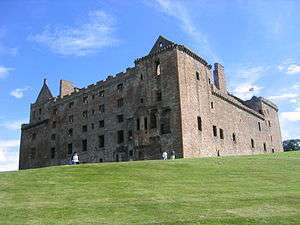
- Dalkeith Palace – Former seat of the Duke of Buccleuch
- Dunfermline Palace – Former palace of the Scottish monarchs
- Falkland Palace – Former palace of the Scottish monarchs
- Hamilton Palace – Former seat of the Duke of Hamilton
- Linlithgow Palace – Former palace of the Scottish monarchs
- Palace of Holyroodhouse – Official residence of the Scottish monarchs and the British monarchs in Scotland since 1503
- Scone Palace – Seat of the Earl of Mansfield
- Seton Palace - Former seat of the Earl of Winton
- Spynie Palace – Former seat of the Bishop of Moray
United States of America
Colorado
- Cliff Palace - Ruins from a dwelling of the Ancient Pueblo People
Florida
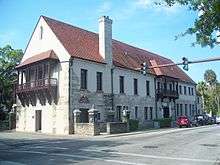
- Government House (St. Augustine) - Official residence of the governors of La Florida, a territory of the Viceroyalty of New Spain, as well as the British colony of East Florida.
Hawai'i
- ʻĀinahau – Royal Estate of Princess Victoria Kaʻiulani
- Brick Palace – First Western style building in Hawaii, commissioned by Kamehameha I for his wife Queen Kaahumanu in Lahaina, and the islands first brick structure
- Haleʻākala – Royal estate of High Chief Pākī, the former grass hut complex on the same site was known as ʻAikupika
- Hamohamo - Royal residence of Queen Lili'uokalani at Waikiki
- Hanaiakamalama – Royal residence of Queen Emma
- Halekamani – Royal residence of Princess Nāhienaena in Lahaina, later sold to Gorham D. Gilman
- Haliʻimaile – Royal residence of Princess Victoria Kamāmalu and her brother Prince Lot Kapuāiwa until he succeed as Kamehameha V, in Honolulu, on the corner of King and Richards streets
- Helumoa – Royal residence of Kamehameha V at Waikiki amongst the coconut groves
- Huliheʻe Palace – Royal residence of Princess Ruth and later King Kalakaua
- ʻIolani Palace - Royal palace, 1882–1893, Honolulu; only official palace in the United States other than the White House
- Kaniakapupu – Royal residence of Kamehameha III and Queen Kalama
- Keōua Hale – Royal residence of Princess Ruth
- Kīnaʻu Hale - wooden bungalow of Queen Emma's uncle (either James Kanehoa or Keoni Ana); located near Iolani Palace, it served as the chamberlain's residence in Kamehameha V's reign and was the place where Kalakaua was inaugurated as King of Hawaii.
- Marine Residence - Royal residence of Lunalilo at Waikiki, where he died, willed to Queen Emma.
- Mauna Kilohana - Royal estate of Queen Emma in Lāwaʻi, Kauaʻi inherited from her uncle Keoni Ana.
- Muolaulani – Royal residence of Queen Lili'uokalani at Kapâlama, now the site of Lili`uokalani Children's Center
- Paoakalani - Royal residence of Queen Lili'uokalani at Waikiki, willed to her by her grandfather ʻAikanaka
- Pualeilani - Royal residence of King Kalakaua, Queen Kapiolani and finally Prince Kuhio, who willed it to the City of Honolulu; the property Uluniu was purchased by the king from Princess Keelikolani in 1880 for $400
- Keʻalohilani - Royal residence of Queen Lili'uokalani at Waikiki, willed to her by her grandfather ʻAikanaka; she composed most of her works in this house
- Rooke House - Private residences of Queen Emma; her childhood home
- Ululani - Royal residence of Victoria Kinoiki Kekaulike on Beretania Street, became the site of the Kapiolani Medical Center for Women and Children
- Waipiʻo Palace - Royal grasshut palace of the ancient kings of Hawaii (island), most significant for the four nioi tree columns which supported it, according to oral traditions; later destroyed by the King Kahekili II of Maui
- Wānanakoa - Private residence of Bernice Pauahi Bishop and Charles Reed Bishop at the beginning of their marriage; it was a small cottage located in the Nuʻuanu Valley where the Royal Mausoleum of Hawaii stands now
- Washington Place - Royal residence of Queen Lili'uokalani
New Jersey
- Proprietary House - Home of both the Proprietary Governors of New Jersey from 1766-1773 and the Royal Governor of New Jersey, William Franklin from 1774-1776.
New Mexico
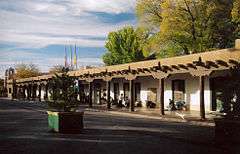
- Palace of the Governors - Oldest continuously occupied public building in the United States. Originally built as a home for the governors of Santa Fe de Nuevo México, a province of the Viceroyalty of New Spain and later, a territory of Mexico.
North Carolina
- Tryon Palace - Royal seat of British colonial rule in the Province of North Carolina.
Pennsylvania
- Pennsbury Manor- Home of William Penn as Proprietor of Pennsylvania from 1683-1701.
Puerto Rico
- Palacio de Santa Catalina - Also known as La Fortaleza
Texas
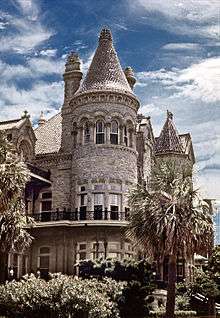
- Bishop's Palace, Galveston - Former residence of the Bishops of the Roman Catholic Archdiocese of Galveston-Houston. Recognized as one of the top fourteen finest examples of Victorian architecture in the United States.
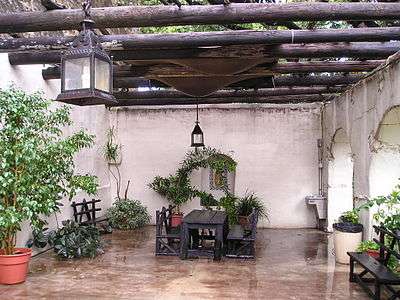
- Spanish Governor's Palace - Official residence of the governors of Tejas, a territory of the Viceroyalty of New Spain. It is considered the sole remaining example of an aristocratic early Spanish house in Texas.[70]
Virginia
- Governor's Palace - Royal seat of British colonial rule in the Colony of Virginia.
Washington, D.C.
- White House - official residence of the President of the United States.
- Number One Observatory Circle - official residence of the Vice President of the United States.
Vatican City
- Apostolic Palace - Residence of the Pope
- Lateran Palace - Seat of the Bishop of Rome
Venezuela
- Palacio de Miraflores - Seat of the President of Venezuela, Caracas
Vietnam
- Imperial Palace (The Forbidden Purple City) - former Seat of the Emperors of Vietnam, Huế
- Presidential Palace in Ha Noi
- Reunification Palace
- Cổ Loa Citadel
- Gia Long Palace
- Thang Long Imperial City in Ha Noi
- Bảo Đại's summer retreats in Nha Trang, Da Lat and Vũng Tàu
- Imperial Citadel of Hoa Lư
- Citadel of the Hồ Dynasty
List of non-residential palaces
Some large impressive buildings which were not meant to be residences, but are nonetheless called palaces, include:
- Alexandra Palace (England)
- Legislative Palace of San Lazaro, Mexico City - Official Seat of the bicameral Honorable Mexican Congress of the Union (Senate and Chamber of Deputies), but ordinary seat of the Chamber of Deputies
- Palace of the Legislative Assembly of the Federal District, Mexico City - Seat of the Legislative Assembly of the Federal District
- Palace of the Parliament, Bucharest: 2nd largest building in world (by floorspace)
- Palacio de Bellas Artes, Mexico City - National house of the arts and culture in Mexico, former legislative palace.
- Palacio de Correos de Mexico, Mexico City - Serves as the mail centre of Mexico City and Mexico itself
- Palacio de Comunicaciones de Madrid (Spain)
- Palast der Republik (Germany)
- Palau de la Música Catalana (Spain)
- Peace Palace (The Netherlands)
- The Crystal Palace (England)
- Galeria degli Uffizi (Italy)
- Victoria Palace - Seat of the Prime Minister, Bucharest
- Palace of Justice in Antwerp (former)
- Palace of Justice in Antwerp (recent)
- Palace of Justice in Brussels
- Palace of facets (Russia)
- Priory Palace (Russia)
- Soviet-era Palaces of Culture (Russia)
- The People's Palace (Scotland)
Note, too, the French use of the word palais in such constructions as palais des congrès (convention centre) and palais de justice (courthouse).
See also
References
| Wikimedia Commons has media related to Palace. |
- ↑ reuters.com
- ↑ Galbraith, William; Canadian Parliamentary Review: Fiftieth Anniversary of the 1939 Royal Visit; Vol. 12, No. 3, 1989
- ↑ Naqada palace
- ↑ Photo of preserved parts of the palace
- 1 2 Photo of the palace remains
- ↑ touregypt.net - Ramesses Nebweben
- ↑ Palace of Apries, background information
- ↑ Pharaoh Apries Wahibre
- 1 2 3 Cleopatra palace
- ↑ The Bahariya Oasis history
- ↑ Old Cairo history
- ↑ Palaces of Pasha
- ↑ Fatimid palaces
- ↑ Plan of the two Fatimid palaces
- ↑ Part of the palace art
- ↑ History of Cairo
- ↑ The Mamluk Sultans
- ↑ Plan of the Sultan al-Salih palace
- 1 2 Palaces of Pashas
- ↑ Amir Alin Aq Palace
- ↑ Reviving Cairo
- ↑ Ruins of Palace
- ↑ Photo of passage
- ↑ The Madrasa-Mosque of Amir Khayerbak (1520-21)
- ↑ Palace of Mangak as-Silahdar
- ↑ Amir Qawsun Palace
- 1 2 3 Bestak Palace museum
- ↑ The Mameluke Amir Taz Palace history
- ↑ Amir Taz Palace
- ↑ Prince Tashtamur palace
- ↑ Al Ghouri palace
- ↑ Insert Al-Ghouri Palace
- ↑ Bait al-Qady
- ↑ Palace of al-Ashraf Qaytbay
- ↑ Jamal al Din al Dhahabi House archnet.org - Gamal al-Din al-Dhahabi
- ↑ El-Aini Palace
- ↑ Harawi residence
- ↑ Historic houses in Cairo
- ↑ Musafirkhana Palace
- ↑ Musafirkhana Palace or Qasr el-Shook
- ↑ Description of the Palace
- ↑ Destruction of Musafirkhana Palace
- ↑ Historic houses & palaces
- ↑ Al-Sinnari House
- ↑ Historic houses in Cairo
- ↑ Egypttoday.com - Cultural Cairo
- ↑ hsje.org
- 1 2 3 4 5 6 7 8 9 Palaces on the nile
- ↑ arabicnews.com - The History of Zaafarama palace
- ↑ GARDEN CITY : A Retrospective PART II, August 20, 1998
- ↑ Egyptology news
- ↑ touregypt.net
- ↑ Harem palace at Citadel
- ↑ &
- ↑ archnet.org - Gezirah palace
- ↑ egy.com - Sakakaini palace
- ↑ Habib Sakakini Palace
- ↑ Al-Ahram Weekly | A constructive streak
- ↑ Egypt State Information Service
- ↑ et - Full Story
- ↑ egy.com - Koubbeh palace
- ↑ egy.com - Tahra palace
- ↑ Cultural Cairo
- ↑ egy.com - The Belgians of Egypt
- ↑ egy.com - Heliopolis Palace Hotel
- ↑ Egypt State Information Service - Mohammed Mahmoud Khalil Museum
- ↑ egyptsites.co.uk
- ↑ Desert research center
- ↑ patrimonionacional.es
- ↑ Spanish Governor's Palace at the City of San Antonio Parks and Recreation
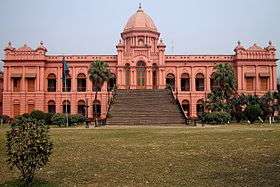

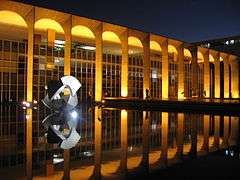
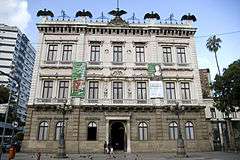



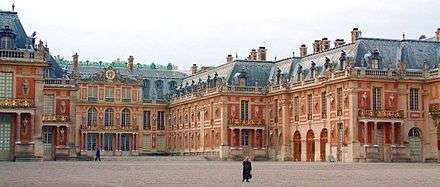



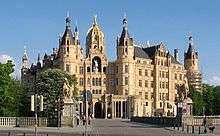

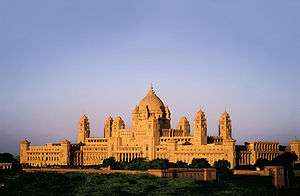


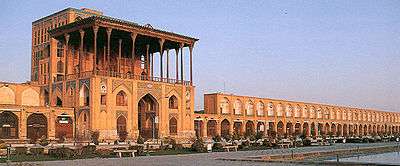
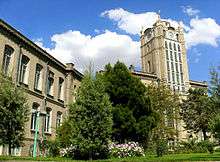
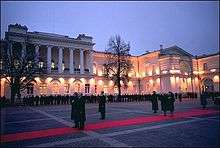

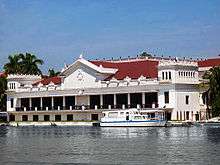
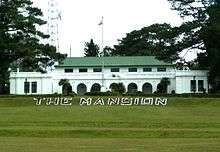
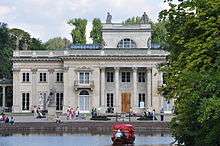
.jpg)
